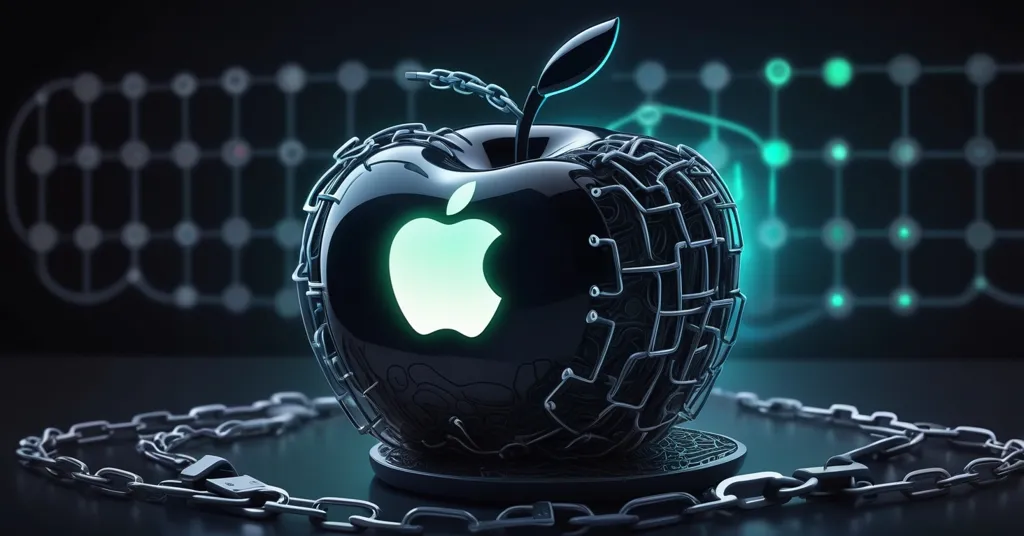Apple Eyes OpenAI and Anthropic for Siri AI Overhaul in 2024 Amid Privacy Concerns

Apple Siri AI Overhaul: Third-Party Models from OpenAI and Anthropic in Talks for 2024
Apple, the fortress of proprietary tech, is reportedly cracking open its gates to third-party AI models for Siri, its virtual assistant that’s been lagging behind the pack. Negotiations with Anthropic and OpenAI hint at a major strategic pivot, driven by underperforming in-house systems and fierce competition. For our audience of Bitcoin and blockchain enthusiasts, this move echoes the eternal debate of control versus convenience—a tension we know all too well in the crypto world.
- Apple is negotiating with Anthropic (Claude) and OpenAI (ChatGPT) to integrate third-party AI into Siri.
- In-house “Apple Foundation Models” are falling short compared to competitors, spurring this shift.
- Privacy risks and high licensing costs pose significant hurdles to the potential deals.
- Internal morale among Apple’s AI teams is tanking, with talent eyeing exits to rivals.
- Parallels to blockchain debates highlight trust and control issues in tech innovation.
Apple’s AI Struggle: Why Siri Needs a Lifeline
Once a trailblazer when it launched in 2011, Siri has become the butt of tech jokes, often fumbling basic tasks like setting reminders or skipping a song. User frustration is rampant—scroll through any tech forum, and you’ll find countless rants about Siri’s inability to keep up with Google Assistant or Amazon’s Alexa. For the uninitiated, Siri is Apple’s voice-activated assistant, meant to handle everything from scheduling to web searches, but its clunky performance has left it trailing in the AI race.
The root issue? Apple’s internal AI systems, known as “Apple Foundation Models,” aren’t cutting it. These are the homegrown engines designed to power Siri’s responses, but internal testing has reportedly shown them lagging behind the likes of Anthropic’s Claude and OpenAI’s ChatGPT. We’re talking slower response times, less accurate answers, and an overall lack of the conversational finesse seen in competitors. Large Language Models (LLMs), the tech behind modern AI chatbots, are essentially powerful systems that learn from massive amounts of text to mimic human speech. Apple’s versions just aren’t matching the benchmark, and with rivals like Samsung leveraging Google’s Gemini for Galaxy AI, the pressure to catch up is immense. Investors are taking notice too, with Apple’s stock spiking up to 3% after news of potential partnerships broke, signaling market hunger for a revitalized Siri. For more on this strategic shift, check out the latest insights on Apple considering external AI for Siri.
Behind the Curtain: Management Shifts and Morale Meltdown
This isn’t just a tech problem; it’s a people problem. A recent shakeup saw Siri’s engineering oversight handed to Craig Federighi, Apple’s software engineering head, and Mike Rockwell, who leads the Vision Pro project. Rockwell, stepping into the fray around March, didn’t waste time— he initiated tests of external models like Claude, ChatGPT, and Google’s Gemini to see how they stack up. Meanwhile, Adrian Perica, VP of Corporate Development, is spearheading talks with Anthropic for custom versions of their tech to run on Apple’s servers. It’s clear the higher-ups are desperate for a quick fix.
But the rank and file aren’t thrilled. Apple’s AI engineers, particularly those under senior director Daphne Luong, are reportedly demoralized. Years of grinding on internal models, only to be told they’re not good enough, stings like a rug pull in a shady NFT drop. Some are jumping ship—senior researcher Tom Gunter bailed after eight years, and others are tempted by offers from Meta and OpenAI, with compensation packages rumored to range from $10 million to $40 million annually. The MLX team even threatened mass resignation but stayed after negotiations. Internal projects like Swift Assist, an AI tool for coding in Xcode, got scrapped in favor of third-party integrations. If Siri can’t parse a simple request, imagine it trying to boost a disgruntled dev team’s spirits. This talent drain could be Apple’s Achilles’ heel if it keeps bleeding expertise to competitors. Read more about the internal challenges in reports on Apple’s AI team morale issues.
Privacy on the Line: A Crypto-Like Conundrum
Apple has built its brand on privacy, championing on-device processing and minimal data collection as a middle finger to Big Tech’s surveillance tendencies. Their Private Cloud Compute system, a secure server setup designed to process data without storing personal info, is meant to keep user trust intact even with external tech in the mix. But integrating third-party AI models from firms like Anthropic or OpenAI raises red flags. How much control does Apple really have over data flows once an outsider’s code is running the show? Will users trust a Siri powered by companies with their own privacy skeletons in the closet? For a deeper dive into these concerns, explore discussions on Siri’s privacy implications.
For those of us in the Bitcoin and blockchain space, this hits close to home. It’s like trusting a centralized exchange with your crypto—convenient until a hack or data leak screws you over. Apple’s dance with third-party AI mirrors the tension between using custodial wallets for ease versus self-custody for true sovereignty. Apple insists safeguards are in place, much like their past defiance of FBI backdoor demands, but skepticism lingers. If a breach happens, or if data handling isn’t as airtight as promised, the backlash could be brutal. Apple AI privacy concerns are mounting, and this gamble could either reinforce their user-first ethos or torch it. Learn more about the broader impact of third-party AI on Apple’s privacy stance.
Blockchain Parallels: Centralization vs. Self-Sovereignty
Apple’s flirtation with external AI isn’t just a Silicon Valley soap opera; it’s a microcosm of debates we wrestle with in crypto every day. Much like Ethereum projects rely on layer-2 solutions for scalability at the cost of some decentralization, Apple’s outsourcing of AI smarts trades control for speed. Bitcoin maximalists might scoff at this, preaching the gospel of self-reliance—build your own node, or in Apple’s case, your own models. Yet altcoin advocates could argue there’s pragmatism in leveraging external strengths to fill gaps, much like interoperable blockchains carve out niches Bitcoin doesn’t touch.
Then there’s the specter of single points of failure. Relying on Anthropic or OpenAI is akin to crypto projects hosting on centralized cloud providers like AWS—efficient until a server outage or policy shift pulls the rug. For Apple, a licensing dispute or data mishap could derail Siri’s functionality overnight. This clash of convenience versus autonomy is the same reason many of us HODL in cold wallets rather than trust third parties. Apple’s struggle offers a lesson for decentralized tech: innovation often demands messy compromises, but at what cost to core principles? Community thoughts on this can be found in Reddit discussions on Siri’s AI partnerships.
The Cost of Catching Up: Licensing and Long-Term Risks
Speaking of costs, let’s talk numbers. Anthropic isn’t playing nice, reportedly demanding multibillion-dollar annual licensing fees for custom versions of Claude, with potential escalations over time. That’s a steep price, even for Apple’s war chest, and it’s causing friction in negotiations. OpenAI is also in the mix, though Apple previously declined their on-device model offers. These costs aren’t just financial—they’re strategic. Locking into expensive contracts could drain resources from in-house R&D, creating a dependency that’s hard to shake. It’s like a crypto project over-relying on venture capital, only to find itself beholden to investors’ whims. For the latest updates on these negotiations, see details on Siri’s potential AI licensing deals.
Geopolitical thorns add to the mess. The EU’s push for open frameworks could force Apple to integrate more third-party tech, while China’s preference for state-sanctioned providers might limit options in key markets. Regulatory scrutiny, already a headache with antitrust battles, could shape how this unfolds. If Apple can’t navigate these waters, the short-term AI boost might come at the expense of long-term agility—much like overregulated crypto stifles innovation in certain jurisdictions. More on the challenges ahead can be found in coverage of Apple’s AI overhaul obstacles.
Future Outlook: Stopgap or Surrender?
Apple isn’t throwing in the towel entirely. A revamped Siri, powered by internal models under the “LLM Siri” initiative, is slated for 2026. Executives like Federighi and Rockwell reportedly view third-party integration as a temporary bridge, not a white flag, with ambitions to dominate AI in future domains like robotics and wearables. But the road ahead is rocky. Beyond licensing costs and regulatory hurdles, talent retention remains a wildcard. If more engineers bolt for greener pastures, Apple’s HODL mentality on in-house tech could crumble.
Could there be a decentralized twist down the line? Imagine Apple exploring blockchain-based AI models, akin to projects like Bittensor, where computation is distributed across networks rather than funneled through a single provider. It’s a long shot, but it would align with privacy goals and sidestep third-party reliance. For now, this pivot feels like a necessary evil—effective accelerationism in action, pushing progress even if it means short-term compromises. But will it turbocharge Siri into a true contender, or is it a Band-Aid on deeper flaws? Apple’s AI gamble mirrors centralized crypto blunders—convenient until it’s not. The tech giant’s next move could redefine how we trust innovation itself. For a broader perspective on Apple’s AI efforts, refer to background info on Apple Intelligence and Siri. Also, check out community benchmarks comparing Apple’s models to competitors.
Key Takeaways and Questions
- What’s pushing Apple toward third-party AI for Siri?
Apple’s in-house models can’t keep up with rivals like Anthropic’s Claude and OpenAI’s ChatGPT, forcing a strategic rethink to stay competitive in the AI race. - How does this challenge Apple’s privacy reputation?
Relying on external models risks clashing with Apple’s privacy-first stance, even with safeguards like Private Cloud Compute, raising doubts about data control. - What’s the vibe among Apple’s AI engineers?
Morale is in the gutter, with teams feeling sidelined; some are leaving or weighing massive offers from competitors like Meta, signaling a talent crisis. - How does this tie into blockchain and crypto debates?
Apple’s outsourcing mirrors crypto’s tension between centralized convenience and decentralized control, echoing Bitcoin self-sovereignty versus altcoin pragmatism. - Is this a temporary fix or a permanent shift for Apple?
Likely a stopgap, as Apple plans a 2026 Siri upgrade with internal tech, though high costs and regulatory pressures could lock in third-party reliance. - What broader tech trends does Apple’s AI pivot reflect?
It highlights the rush for AI dominance, much like blockchain’s race for adoption, where speed often trumps ideals—raising questions about trust and long-term innovation.



